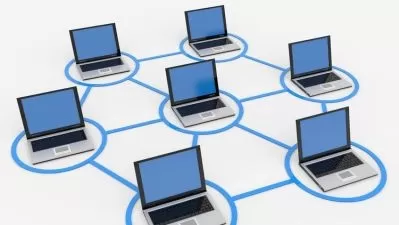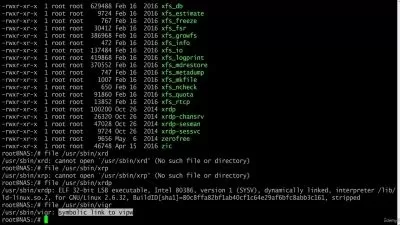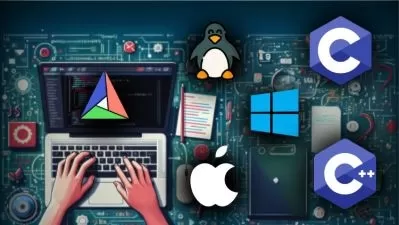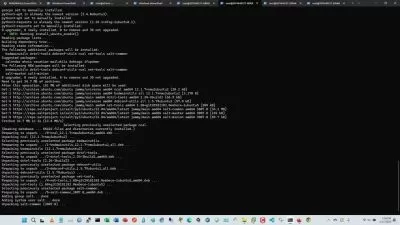Ultimate LPIC-1 Linux Certification Mastery (101-500)
Focused View
17:58:56
1 - Meet Your Instructor Vit.mp4
03:24
2 - Your Learning Adventure Begins.mp4
02:21
3 - Course Delivery.mp4
02:57
4 - Regular Lesson Sructure.mp4
01:48
5 - Installation and Package Management Troubleshooting.mp4
12:22
6 - USB Device Detection and Management in Linux Using lsusb.mp4
04:55
7 - Using dmesg for System Monitoring and Troubleshooting in.mp4
04:48
8 - Understanding Linux Run Levels System Maintenance and Tr.mp4
10:03
9 - lspci Command Capabilities for System Hardware Analysis.mp4
03:10
10 - Manual File System Mounting and systemd Behavior.mp4
06:20
11 - Log Filtering with grep Time Range Extraction.mp4
04:26
12 - Command Redirection Effects on Nonexistent Files.mp4
03:24
13 - Regular Expressions for File Renaming on Transforming Output.mp4
04:36
14 - Man Command Usage for Displaying Section 1 Manual Pages.mp4
02:59
15 - Hard and Symbolic Links Creation Using ln Command.mp4
07:35
16 - Understanding and Monitoring IRQ.mp4
04:22
17 - UDEV Configuration and Device Management.mp4
05:26
18 - Grep Command with v Option for Inverting Match Output.mp4
05:35
19 - Default File System Created by mkfs Command.mp4
03:39
20 - Kernel Module Management Using modprobe and rmmod.mp4
04:11
21 - SystemV init configuration What happens when run levels c.mp4
03:31
22 - Debian package management How to locate package owners.mp4
02:30
23 - Archive manipulation What remains after gunzip on tgz fil.mp4
04:27
24 - BIOS boot sequence Understanding the initial startup proc.mp4
03:44
25 - DPKG package management Removing configuration files on u.mp4
04:02
26 - Administration and Monitoring with udevadm.mp4
05:26
27 - Nice Levels in Linux Process Management On What and How.mp4
02:02
28 - Bash Output Redirection Techniques On Standard Streams.mp4
07:15
29 - Current Working Directory in Bash On Methods to Display.mp4
04:48
30 - Identifying RootOwned Processes On Effective Commands.mp4
02:40
31 - Extracting User Information from etc passwd On Techniques.mp4
03:01
32 - Linux Command Path and the Which Command on Executables.mp4
01:43
33 - Package Management Uninstallation Retaining Config Files.mp4
01:30
34 - Init Process ID in Unixlike Systems and Its Significance.mp4
03:30
35 - Preventing Faulty Kernel Module Loading at System Boot.mp4
05:58
36 - Zypper Package Manager and PatternBased Installation.mp4
04:05
37 - VI Editor File Saving Commands in Unixlike Systems.mp4
05:05
38 - Extracting User Data from etc passwd with Cut Command.mp4
03:21
39 - VI Editor Reverse Search and Text Manipulation.mp4
04:48
40 - Process Signals and Job Control in Unixlike Systems.mp4
02:42
41 - Command Output Redirection Using the tee Command.mp4
03:19
42 - GRUB2 Standard Installation Files What You Need to Know.mp4
03:51
43 - Advanced File Search Techniques Locating RootOwned Files.mp4
06:05
44 - Vi Command for Deleting Multiple Lines in Unix Systems.mp4
03:39
45 - Default Reserved Space Percentage in Ext4 File Systems.mp4
08:18
46 - Here Document Syntax for Multiline Input in Linux.mp4
04:24
47 - Modifying File System Check Interval on Ext3 Systems.mp4
05:00
48 - Converting Windows to Linux Line Endings Using tr.mp4
04:00
49 - SIGINT Signal Sent by CTRLC and Process Management.mp4
03:00
50 - GRUB Installation Command for First Disk and Partitions.mp4
03:08
51 - APTGET DistUpgrade for Updating All Installed Packages.mp4
03:55
52 - Listing Installed Packages with RPM Query All Command.mp4
02:07
53 - Installing GRUB2 on Third Hard Disk Command and Usage.mp4
03:31
54 - Background Processes Understanding the Ampersand in Shell.mp4
03:31
55 - VM Cloning on What to Modify for System Security.mp4
02:13
56 - Process Niceness Maximum Value for Regular Users.mp4
03:39
57 - XFS File System Recovery Methods After Power Outage.mp4
02:28
58 - Valid Reasons Not to Use Hardlinks in Linux Systems.mp4
02:20
59 - Standard Location of Man Pages in Linux File System.mp4
04:25
60 - Removing Directory with Special Characters in Name.mp4
05:55
61 - Understanding Shell Command Processing with type.mp4
02:25
62 - Displaying Inode Numbers Using ls and stat Commands.mp4
02:22
63 - Viewing Compressed Archives with tar and gzip.mp4
03:56
64 - Dividing Files into Segments Using the split Command.mp4
04:53
65 - Understanding Initramfs in the Linux Boot Process.mp4
04:09
66 - YUM Repository Configuration How are repos managed.mp4
07:03
67 - Linux Boot Process What is the initial program started.mp4
03:26
68 - File Content Search How does grep use regular expressions.mp4
06:30
69 - Hard Links in Backups What advantages do they offer.mp4
09:23
70 - Limiting Search Depth with find Command maxdepth Option.mp4
04:46
71 - Comparing Linux Containers and Virtual Machines Key Differences.mp4
03:08
72 - Alternative Device Identifiers in etcfstab UUID and Label.mp4
05:33
73 - VI Command to Insert Deleted Content Below Current Line.mp4
03:22
74 - Understanding etcfstab Structure Number of Fields in etcfstab.mp4
02:25
75 - Executing Shell Scripts Without Subshells How and Why.mp4
04:42
76 - Introduction to Red Hat Distro.mp4
08:37
77 - Installing VirtualBox on Mac.mp4
07:25
78 - RHEL Installation.mp4
05:31
79 - RHEL Registration with Subscription Management.mp4
03:14
80 - RHEL Virtual Machine Creation and Management with Cockpi.mp4
10:53
81 - RHEL Customizing Hostnames and Creating Snapshots with C.mp4
05:44
82 - Creating Lab Environments Installing and Configuring Vag.mp4
06:52
83 - Linux History and OpenSource Development.mp4
06:01
84 - Linux Advantages Collaborative Development and Rapid Fix.mp4
00:03
85 - Linux Licensing Models.mp4
06:01
86 - Components of Linux Distributions.mp4
04:10
87 - Common Uses of Linux.mp4
09:58
88 - Linux in the Cloud Overview.mp4
06:09
89 - Linux Shell Basic Commands.mp4
09:17
90 - Using Basic Commands.mp4
07:35
91 - Introduction to Shell Metacharacters in Linux.mp4
11:38
92 - Linux Help Systems and Proper Shutdown Procedures.mp4
14:51
93 - Navigating the Linux File System Understanding Directory.mp4
14:51
94 - Linux Directory Navigation Essential Commands.mp4
10:49
95 - Understanding Linux File Types.mp4
14:08
96 - File Listing Techniques in Linux Exploring ls Command Op.mp4
15:16
97 - Wildcard Metacharacters in Linux File Management.mp4
15:27
98 - File Content Display in Linux.mp4
10:45
99 - Text Processing with Grep in Linux.mp4
08:17
100 - File and Directory Management Essential Linux Commands.mp4
11:23
101 - File Manipulation Copying Moving and Removing.mp4
10:11
102 - File Security Understanding and Utilizing File Attribute.mp4
06:06
103 - Searching in Linux the find Command for Efficient File.mp4
04:18
104 - Searching in Linux Part 2.mp4
06:29
105 - Searching in Linux Part 3.mp4
03:16
106 - Searching in Linux Part 4.mp4
03:03
107 - HandsOn Guide to Finding Large Files and Creating a Long.mp4
03:46
108 - Setting up File Permissions Essential Linux Security Con.mp4
08:38
109 - File Access Control with Linux Permissions.mp4
05:40
110 - Setting Up Group Permissions in Linux.mp4
07:56
111 - HandsOn Demo Configuring Linux Permissions for Team Dev.mp4
05:11
112 - Introduction to Basic Navigation in Vim.mp4
04:25
113 - Handson Practice Vim Installation and Basic Navigation.mp4
14:36
114 - Fundamentals of Editing in Vim.mp4
05:21
115 - Basic Vim Navigation.mp4
14:23
116 - Advanced Vim Navigation.mp4
04:21
117 - Vim Search and Replace.mp4
07:07
118 - Vim Copy and Insert.mp4
05:40
119 - Vim Fundamentals A Comprehensive Review of Core Concepts.mp4
05:45
120 - Overview of Exercise Lessons What will we learn.mp4
03:52
121 - Exercise 1 Editing in Vim.mp4
09:43
122 - Exercise 2 Editing in Vim.mp4
07:47
123 - Exercise 3 Editing in Vim.mp4
11:26
124 - Exercise 4 Editing in Vim.mp4
13:20
125 - Navigating and Editing Multiple Files in Vim.mp4
07:31
126 - Searching the needed info with grepwc.mp4
03:15
127 - Cat and output redirection.mp4
03:01
128 - Using pipes.mp4
01:08
129 - Processes revealed.mp4
07:04
130 - Processes and jobs.mp4
07:21
131 - Exploring all running processes with top command.mp4
08:58
132 - Understanding process states.mp4
03:46
133 - Changing process priority with nice.mp4
04:42
134 - Controlling processes with signals.mp4
05:16
135 - Changing password and working with PATH.mp4
04:40
136 - Special characters and commandline keystrokes.mp4
04:06
137 - Chaining operators.mp4
05:51
138 - Sed and awk.mp4
03:16
139 - Sed and awk Part 2.mp4
03:47
140 - Performing exit reboot or shutdown on the system.mp4
02:26
141 - Using BASH history.mp4
08:18
142 - Using aliases to create your own commands.mp4
03:12
143 - Watching files updates live with watch command.mp4
04:21
144 - Gaining administrative privileges with sudo command.mp4
12:16
145 - Managing packages with rpm command.mp4
04:37
146 - Managing packages with rpm command.mp4
06:18
147 - Installing and modifying packages with rpm command.mp4
08:31
148 - Viewing pgp keys and verifying package attributes.mp4
05:55
149 - YUM package manager Part 1.mp4
04:38
150 - YUM package manager Part 2.mp4
05:00
151 - YUM package manager Part 3.mp4
07:52
152 - Configuring hostname.mp4
05:45
153 - IPv4 concepts and traceroute command usage.mp4
14:56
154 - Using ip command.mp4
06:04
155 - Validating and Troubleshooting Network Configuration.mp4
07:36
156 - Practice Lab Examining Network Configuration.mp4
03:06
157 - Configuring Networking with nmcli.mp4
10:03
158 - Validating Network Configuration with Guided Exercise.mp4
11:07
159 - Editing Network Configuration Files with Guided Exercise.mp4
09:27
160 - Lab Managing Networking.mp4
05:44
161 - Users Intro id command passwd file.mp4
06:52
162 - Users Gaining Superuser Access su and sudo commands.mp4
08:20
163 - Users Configuring sudo.mp4
06:26
164 - Users Guided Exercise Using sudo.mp4
10:44
165 - Users Using useradd userdel and usermod.mp4
10:05
166 - Users Practice excersise with useradd userdel and userm.mp4
03:05
167 - Groups groupadd groupdel and groupmod.mp4
06:20
168 - Groups adding users to groups.mp4
04:35
169 - Users working with passwords.mp4
12:25
170 - Users Practice Working with passwords.mp4
06:01
171 - Lab Managing Users and Groups.mp4
06:18
172 - File permissions.mp4
11:18
173 - Changing Permissions for Files and Directories.mp4
08:12
174 - Changing Ownership for Files and Directories.mp4
04:35
175 - Guided Exercise Managing File System Permissions.mp4
05:15
176 - Umask and Managing Default Permissions and File Access.mp4
12:59
177 - Guided Exercise Umask and Managing Default Permissions.mp4
07:34
178 - Lab Controlling Access to Files.mp4
08:23
More details
Course Overview
Master Linux administration and ace the LPIC-1 101-500 exam with this comprehensive certification prep course featuring 75+ practice questions, hands-on labs, and real-world system administration skills.
What You'll Learn
- Master essential Linux commands, shell scripting, and system automation
- Implement package management with YUM, APT, and Zypper
- Configure user accounts, file permissions, and network security
Who This Is For
- IT professionals seeking LPIC-1 certification
- Career changers entering Linux administration
- Windows admins expanding to Linux systems
Key Benefits
- 100% exam readiness with simulated test environments
- From beginner to certified with zero prior Linux experience
- Hands-on labs covering all 101-500 exam objectives
Curriculum Highlights
- LPIC-1 101-500 Practice Questions & Troubleshooting
- Linux Fundamentals & System Administration
- Advanced Vim, Process Control & Network Configuration
Focused display
Category
- language english
- Training sessions 178
- duration 17:58:56
- Release Date 2025/05/31











